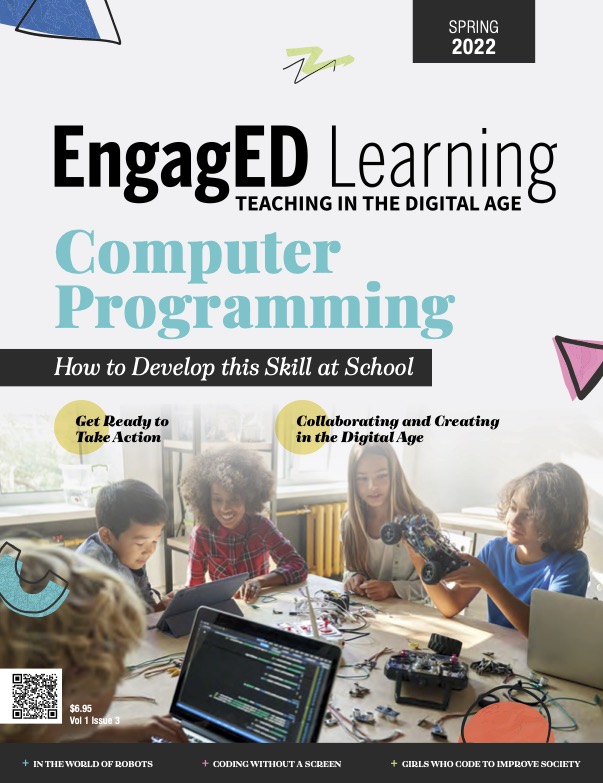
Partager :
This article contains all the references of EngagED Learning Magazine, Volume 1 issue 3, Spring 2022.
Barma, S. (2018). Réaliser une étude de cas multiple qui vise à affiner les connaissances sur l’usage pédagogique ou didactique de la programmation dans les écoles du Québec. Université Laval. https://lel.crires.ulaval.ca/sites/lel/files/barma_mees_rapport_final_-_lel.pdf
Davidson, A.-L. et Ruby Ivan. (2019). Pourquoi apprendre à coder? La Conversation. https://theconversation.com/pourquoi-apprendre-a-coder-109206
Häkkinen et al., 2017. Preparing teacher-students for twenty-first-century learning practices (PREP 21): a framework for enhancing collaborative problem-solving and strategic learning skills, Teachers and Teaching, 23:1, 25-41, https://doi.org/10.1080/13540602.2016.1203772
Ministère de l’Éducation du Québec. (2019). Continuum de développement de la compétence numérique – Cadre de référence de la compétence numérique. Gouvernement du Québec. http://www.education.gouv.qc.ca/en/current-initiatives/digital-action-plan/digital-competency-framework/
Ministère de l’Éducation du Québec. (2020). L’usage pédagogique de la programmation informatique. Gouvernement du Québec. http://www.education.gouv.qc.ca/fileadmin/site_web/documents/ministere/Usage-pedagogique-programmation-informatique.pdf
Poleemploi.fr. 85 % des emplois de 2030 n’existent pas encore. https://www.pole-emploi.fr/actualites/le-dossier/les-metiers-de-demain/85-des-emplois-de-2030-nexistent.html#
Resnick, M., Maloney, J., Monroy-Hernandez, A., Rusk, N., Eastmond, E., Brennan, K., Millner, A., Rosenbaum, E., Silver, J., Silverman, B., and Kafai, Y. (2009). Scratch: programming for all. Communications of the ACM 52(11), 60–68.
Rioux, M. (2021). Commencer la programmation avec ScratchJr ou Scratch en classe. École branchée. https://ecolebranchee.com/commencer-la-programmation-avec-scratchjr-ou-scratch-en-classe/
Resources
RÉCIT du préscolaire : recitpresco.qc.ca/fr/robotique
RÉCIT Inclusion et adaptation scolaire : recitas.ca/robotique
RÉCIT Univers social : recitus.qc.ca/technologie/publication/code-us
RÉCIT MST : https://robot-tic.qc.ca/
Papert, S. (1980). Mindstorms. https://docs.google.com/viewer?a=v&pid=sites&srcid=ZGVmYXVsdGRvbWFpbnxha2hsYWdoZWF8Z3g6NzgyOWYxNWNjMjE5ZjVh, p.19
Romero, M. (2019). La programmation n’est pas que technologique. Programmer : une démarche sensible, culturelle et citoyenne pour résoudre des problèmes. Spectre, 49. https://www.researchgate.net/publication/336702915_La_programmation_n’est_pas_que_technologique_Programmer_une_demarche_sensible_culturelle_et_citoyenne_pour_resoudre_des_problemes
Ministère de l’Éducation. Compétences transversales. http://www.education.gouv.qc.ca/fileadmin/site_web/documents/education/jeunes/pfeq/PFEQ_competences-transversales-primaire.pdf
Government of Canada. (2019). Building a Nation of Innovators. https://www.ic.gc.ca/eic/site/062.nsf/eng/h_00105.html
Ministère de l’éducation. (2019). Digital Competency Development Continuum. Digital Competency Framework. http://www.education.gouv.qc.ca/fileadmin/site_web/documents/ministere/continuum-cadre-reference-PAN-en.pdf
Resnick, M. (2017). Lifelong kindergarten: cultivating creativity through projects, passion, peers, and play. MIT Press.
Resources:
Davidson, A.-L. (2018). How Can Makerspaces Heighten Student Engagement? EdCan Network. Facts on Education. https://www.edcan.ca/articles/makerspaces-heighten-student-engagement/
Éthier, Lefrançois et Demers. (2014) Faire aimer et apprendre l’histoire et la géographie au primaire et au secondaire, Éditions Multimondes, https://editionsmultimondes.com/livre/faire-aimer-et-apprendre-l-histoire-et-la-geographie-au-primaire-et-au-secondaire/
Training (in French):
Minecraft Education en MST : https://campus.recit.qc.ca/course/view.php?id=329
Jeux sérieux en univers social : https://campus.recit.qc.ca/course/view.php?id=60#section-0
RÉCIT de l’univers social: recitus.qc.ca
Padlet de ressources: https://padlet.com/srimcssbf/us
Resources
Downloadable activities (COLORI) (In French): https://colori.education/
Technology-free preparatory activities (CSSDM) (In French): https://cybersavoir.csdm.qc.ca/robotique/activites-sans-technologie/
Technology-free activities (Service national du RÉCIT du préscolaire) (In French): https://recitpresco.qc.ca/fr/pages/robotique/activites-preparatoires-lire-des-plans-manipuler-des-engrenages
References
Colgan, L. (2020, December 7). Why a computer isn’t the first thing you need when teaching kids to code. The Conversation. https://theconversation.com/why-a-computer-isnt-the-first-thing-you-need-when-teaching-kids-to-code-149722
Bodu, F. (2020). La pédagogie Montessori : comprendre ses fondamentaux et les mettre en application. Hatier.
Resources
References
Pour vous offrir une expérience optimale, nous utilisons certaines technologies — dont les témoins (cookies) — afin de stocker et/ou d’accéder à des informations liées à votre utilisation du site. Votre consentement nous aide à mieux comprendre votre parcours de navigation et à améliorer nos contenus et services. Le refus ou le retrait de votre consentement pourrait toutefois limiter le fonctionnement de certaines fonctionnalités.